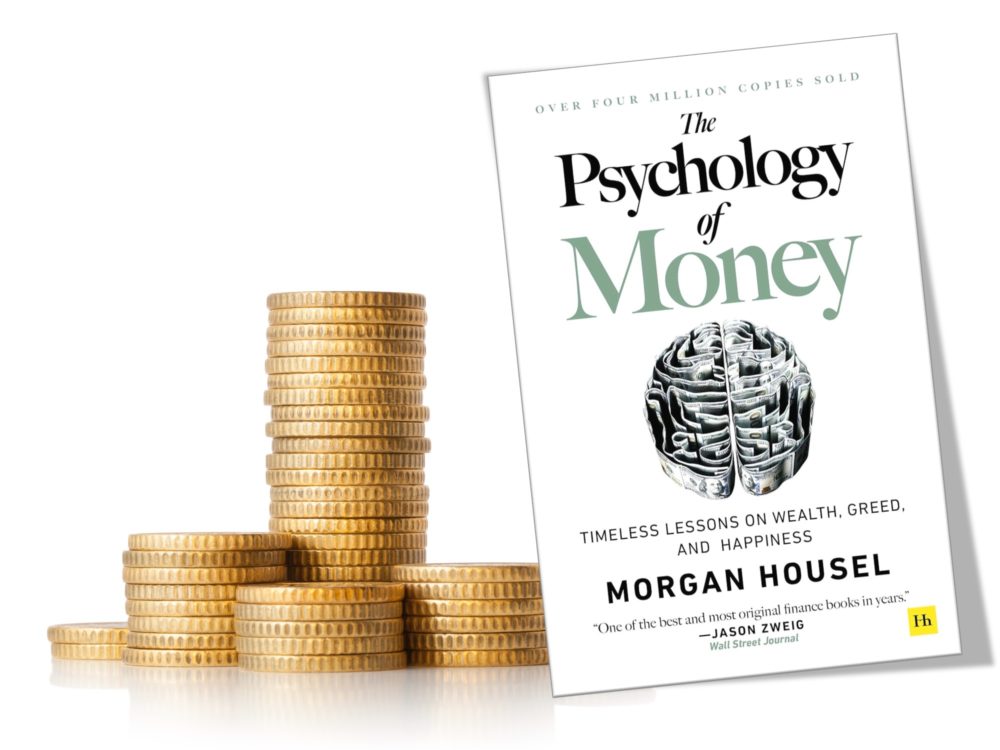Overview
Morgan Housel’s “The Psychology of Money” is claimed as one of the most original contributions to financial literature in recent times. The book offers a series of 20 thought-provoking lessons that delve into the intricate relationship between wealth, greed, and happiness. Housel’s calm and collected narrative doesn’t just aim to guide readers to financial prosperity but rather to a state of contentment and fulfilment.
Each chapter serves as a reflective lesson on the various psychological factors that influence our financial decisions. Housel’s writing is insightful, steering clear of the get-rich-quick schemes that contaminate the genre, and instead provides a roadmap to a happier, more satisfied life through financial understanding.
Synopsis
The book has 20 chapters that are analysing a broad range of aspects of the money and its psychology.
- No One’s Crazy: This chapter discusses how money decisions aren’t always rational and are influenced by personal experiences and backgrounds.
- Luck & Risk: Here, Housel examines the role of luck and risk in financial success and how they can be easily confused with each other.
- Never Enough: It focuses on the idea of sufficiency and the risks of always wanting more, which can lead to greed and excessive risk taking.
- Confounding Compounding: This part explains the power of compounding returns over time and its impact on wealth accumulation.
- Getting Wealthy vs. Staying Wealthy: Housel differentiates between making money and keeping it, emphasising the importance of humility and frugality.
- Tails, You Win: The chapter explores the concept of ‘tail events’ and their outsized impact on our financial lives.
- Freedom: It’s about the ultimate goal of having money, which is to gain control over our time and choices.
- Man in the Car Paradox: This section delves into how others perceive our wealth and why it shouldn’t matter.
- Wealth is What You Don’t See: Housel talks about savings and how true wealth is the assets you don’t spend.
- Save Money: The importance of saving, regardless of income, is highlighted in this chapter.
- Reasonable > Rational: This part discusses why being reasonable is more important than being rational when it comes to money.
- Surprise!: Housel addresses the inevitability of financial surprises and the need to be prepared for them.
- Room for Error: The concept of having a margin of safety in financial planning is explored here.
- You’ll Change: This chapter covers the changes in personal finance needs and behaviours over a lifetime.
- Nothing’s Free: It discusses the costs and trade-offs in financial decisions.
- You & Me: Here, the differences in people’s financial behaviours and outcomes are examined.
- The Seduction of Pessimism: Housel explains why pessimistic views often sound smarter but are not necessarily true.
- When You’ll Believe Anything: The chapter talks about the influence of storytelling in our financial perceptions.
- All Together Now: This section brings together all the lessons from the book.
- Confessions: Housel shares personal anecdotes and lessons learned from his own financial journey.
Why you should read it
The book is a compelling read that delves into the behavioural aspects of personal finance, making it an essential book for anyone looking to understand the often-irrational world of money management. It’s not just a book for financial experts; it’s for anyone who has ever felt puzzled by the economic decisions people make. Housel uses a blend of history, psychology, and personal anecdotes to unravel why smart people make poor financial choices and how one’s background can shape their financial perspective.
What makes this book particularly accessible to a non-expert audience is Housel’s conversational tone and his avoidance of complex financial jargon. Instead of focusing on the technicalities of investing or financial planning, Housel emphasises the importance of behaviour, beliefs, and biases in financial success. He illustrates his points with relatable stories and historical examples, making the lessons memorable and easy to apply to one’s own life.
Critics and review
While the book’s insights are universally applicable, it does present a predominantly American viewpoint on financial matters. Housel’s discussions heavily favour stock market investments, almost to the exclusion of other forms of saving and investment. This perspective may not resonate with readers who are looking for a more global outlook or who are aware of the principle that stock investments should only be made with money one is prepared to lose — a caution often echoed by financial experts.
Despite its US-centric approach, Housel’s methodology is undeniably appealing. In a world where greed often seems to take center stage, “The Psychology of Money” offers a different narrative — one that values personal satisfaction over financial gain. Housel’s work is a treat for those seeking a respite from the relentless pursuit of wealth, providing a perspective that encourages readers to reevaluate what truly matters in their financial lives.
In conclusion, “The Psychology of Money” by Morgan Housel is an essential read for anyone interested in the intersection of finance and well-being. It’s a book that challenges conventional wisdom and encourages a deeper understanding of the role money plays in our lives.
About the author
Morgan Housel is a distinguished financial writer and investor, widely recognised for his insightful perspectives on money, investing, and behavioural economics. He is a partner at The Collaborative Fund, a venture capital firm that focuses on the intersection of finance, innovation, and social progress. Housel is the author of the New York Times Bestselling book “The Psychology of Money,” which has sold over five million copies and been translated into more than 50 languages. His accolades include winning the Best in Business Award from the Society of American Business Editors and Writers twice, and in 2022, he was named one of the 50 most influential people in markets by MarketWatch. Housel’s educational background includes a degree in Economics from the University of Southern California. Prior to his role at The Collaborative Fund, he was a columnist for The Motley Fool and The Wall Street Journal.
#FinancialWisdom #MorganHousel #PsychologyOfMoney #PersonalFinance #WealthMindset #BehavioralEconomics #FinancialLiteracy #InvestmentPsychology #MoneyManagement #EconomicBehavior













